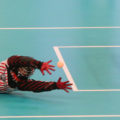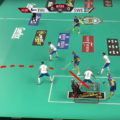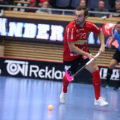In our referee series, helped by world-class referee Thomas Andersson, we focus on improving your refereeing skills. We received a few reader questions about communication and decided to ask them to Andersson.
What’s most important to look at when you talk to a player?
“Several things are important. One is to secure that you do not miss anything else happening on the pitch while having the discussion. Cooperation with your partner (dividing responsibilities) is key regarding this!
(Article continues below picture)

Also feeling what the player is concerned about, the energy level and importance. A good rule of thumb is to try to ‘mirror’ the player and aim to steer the discussion towards a constructive one. Keep eye contact and confirm that you have heard the player’s concern.
Depending on when the player approaches you also gives you a guideline on how long the discussion can last. What we usually use (and this we align with team captain and team staff before the game) is that, if they ask a question (not a statement) in a polite manner, we can and will respond. If we feel the need for further discussion, we postpone this to the intermission or after the game.
We don’t want the game pace to be interrupted by discussions, we want a fast floating game, appealing for the spectators! This topic of communication can be discussed and explained in a wider way, but the ‘rule’ here is: one questions, one answer.”
READ – 10 crucial referee tips for beginners
How do you react to coaches?
“Before each game, we try to talk to the coaches. If we have never met before, we tell them they can always ask us a question during the game – if it’s concrete and in a polite manner. If so, they will then receive an answer and then we can see if more discussion is needed. In this scenario, we usually take this into the intermission, just like said in the previous answer (we don’t want to interrupt the flow in the game).
If the coaches generally complain, we try to use the ‘feedback ladder’, consisting of three steps:
- We approach the coach (also applicable on players) during the play and between four eyes ask him/her to stop. This we call ‘quiet reprimand’.
- Here we call a time out and stop the play during a free hit or hit in. We then inform that the behavior is not acceptable, which is shown for the full venue, so everyone is aware of this. This we call ‘public reprimand’.
- Penalize! We have given the coach (or player) the chance to change his/her behavior. After the second step, the public reprimand, everyone understands why there is a penalty.
This is a theoretical tool that needs to be adapted to each particular situation/person, so you can – of course – skip steps if the situation so requires it.”
Do you get annoyed by whining players?
“The difficult part is that, when players are communicating in a non-constructive way [‘whining’], it drains our focus on what is really important – the game, coming play and situations.
As a referee, I understand that when a player reacts it’s important for this player. The tricky thing is to handle this situation without losing focus on all other situations on the field. As a referee, we usually take approximately six hundred decisions per game (this could be a foul or a decision to continue to play) and we cannot lose focus on the next situation due to players’ reactions.
Here we would like to apply the ‘one constructive question and one answer’-rule in a better way and I think this would lead to better long-term cooperation and understanding.”
Do you sometimes think players would like to hit you?
“I hope not! But of course, I understand that there is a lot at stake in each game and in every situation. This – together with adrenaline and high pulse – could give the player extra emotions right there, but it would take a lot for them to come into a situation of them actually hitting me. And if they did, they would not play for a really long time due to suspension. Referees are human and we make mistakes, but this will never justify for a player/coach to get physical!”
Are there some players or fans that you are afraid of?
“I am super happy that we have such great supporters in floorball! I have colleagues in other sports (football as one example) that have suffered a lot from threats. Some even stopped reffing, due to threats to their families! Of course, football is bigger and there is a lot more money involved and refs are employed only for this.
I have a full-time job and reffing is my hobby (and I have the best hobby in the world) and I thank my family that they support me!
However, I have been threatened once. This was handled very well by the club this supporter represented, so I think we have a great foundation to grow supporter culture on.
I know over time floorball will continue to grow and being a part of the Olympics will boost a lot I think.”
Do you have any questions about this article or specific questions you’d like to ask Thomas Andersson? Send us a message on social media or mail (daniel[@]floorballtoday.com)!






No Comments
Leave a comment Cancel